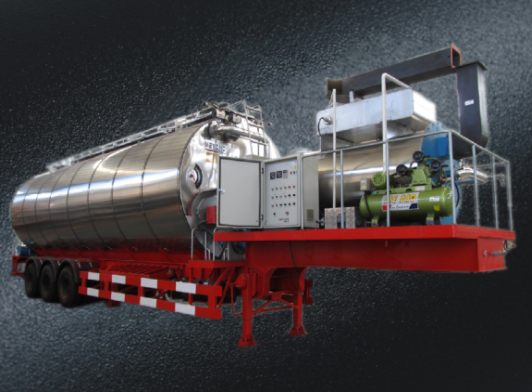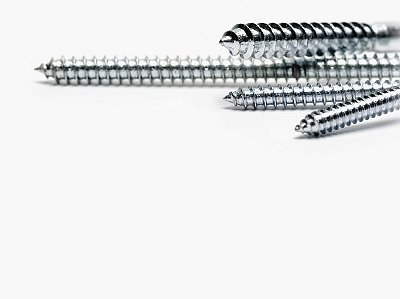November in New England, where Cambridge Viscosity is headquartered, is the time of year when our leaves finish falling and the weather turns cold. Soon, it will be snowy and frigid in Massachusetts. (Who are we kidding – we had our first snowfall in October this year!) Inspired by the chill in the air, we thought we’d talk about some of the challenges of measuring viscosity in colder atmospheric conditions, where ambient temperatures fall below 50 °F for part of the year
Measuring viscosity in asphalt leads to a reduction in energy usage
Nov 17, 2020 2:59:47 PM / by Patrick Riley posted in viscosity control, asphalt viscosity, ViscoPro 2100, process viscometer
CVI Supports R&D for the Use of Nanoparticles in Heat Transfer Fluids
Nov 11, 2020 4:08:10 PM / by Patrick Riley posted in viscosity measuring solution, viscosity control, viscosity management, viscometer support
It’s always interesting to see how our customers use the Cambridge Viscosity viscometers to support product development and continuous improvement. Our customers monitor viscosity in thousands of unique applications – they develop pharmaceuticals that improve quality of life, they test engine oils to make sure cars and airplanes operate more efficiently and heavy marine fuel so shipping companies to achieve proper fuel efficiency. They monitor the viscosity of coatings, to create high-quality lenses of all types. And, in the oil and gas industries, our viscometers provide the data necessary to understand the makeup of the raw material, so it can be handled and processed appropriately.
Viscosity Measurement Helps to Overcome Manufacturing Challenges
Oct 21, 2020 6:00:00 AM / by Patrick Riley posted in viscosity measuring solution, viscosity control
Quality control and the ability to meet the demand for rapidly changing technologies are big challenges for electronic components manufacturers. Parts like capacitors – which can be as small as the head of a pin in certain applications – must meet critical performance targets. Cambridge Viscosity helped a U.S.-based manufacturer overcome one of its manufacturing challenges. The company wanted to use a paste to apply dielectric material with highly precise characteristics in a paste form onto a capacitor substrate, which had a significant impact on the final product characteristics.
How to Use Temperature Compensated Viscosity on my Viscometer
Jul 15, 2020 4:06:14 PM / by Patrick Riley posted in viscosity measuring solution, viscosity control, How to measure viscosity
Viscosity and temperature are interdependent. Correlating viscosity data between the process and the laboratory can be difficult, especially when the process temperature fluctuates and the lab viscosity measurements are taken at a fixed temperature. More often than not, periodic lab viscosity measurements are not adequate for process control as process changes can result in drift and the result is that the actual viscosity od the end-product and end up significantly different from the lab projection.
The answer to this problem is TCV or Temperature Compensated Viscosity.
TCV provides an accurate calculation of viscosity at a specific reference temperature which differs from actual process conditions. This function assumes a linear relationship between temperature and the double logarithm of viscosity and is based on ASTM Method D341. Once enabled, TCV is highly accurate for Newtonian hydrocarbons and yields a reliable approximation for most other Newtonian and non-Newtonian fluids.
The ViscoPro2100 viscometer incorporates a TCV feature and it can be enabled through the Web User Interface (UI). The following article provides you with the necessary information to enable and set-up the Temperature Compensated Viscosity feature on your viscometer so that you can adequately correlate the process viscosity and laboratory viscosity and provide uniform product to your customers.
Metong Machinery Company uses In-Line Viscometers for Asphalt Coating
Jan 21, 2020 8:00:00 AM / by Admin posted in VISCOpro2000, process viscometers, monitor viscosity, viscosity control, fuel combustion, asphalt viscosity
Boston—Cambridge Viscosity’s in-line viscometer, VISCOpro 2000, is being used by Zhejiang Metong Machinery Company, a leading producer of road construction and maintenance equipment.
The company’s primary products include truck-mounted asphalt systems sold worldwide, asphalt melting equipment and the largest emulsified asphalt plant in China.
Metong’s MT-AR50 Portable Reaction Tank is specially designed for reaction, storage and transportation of rubberized asphalt. Used to pave asphalt roads, the waste tire rubber powder and rubberized asphalt mixture improves pavement function, extends service life and reduces the environmental pressure caused by waste tires. Rubberized asphalt meets the national policy of building a conservation-minded society and developing a cyclic economy.
Metong uses Cambridge’s in-line viscometers to monitor and control asphalt viscosity for their truck-mounted systems. Viscosity is key in monitoring the quality of the rubberized asphalt. In the tank, the asphalt’s viscosity changes according to temperature and the length of time it is contained. The sensors help to maintain constant viscosity by adapting the temperature as needed to obtain a more consistent spray pattern, allowing an even coating to be sprayed onto the road for a higher quality result.
“Viscosity is one of the most important parameters for providing consistent spray patterns for our asphalt application,” explains Technical Engineer Mr. Yang. “We considered several other technologies such as rotational and vibrational viscometers but found the Cambridge viscometer to be the best choice for us due to its compact size, simple design and rugged construction,” says Technical Director Mr. Feng.

About Cambridge Viscosity
Cambridge Viscosity is the leading supplier of automated viscometers used by oil exploration and refining, coating, chemical and life science companies to optimize product and process performance. Cambridge Viscosity's sensors and viscometer systems conform to ASTM, DIN, JIS and ISO standards, with a range of models designed to meet specific industry and application needs.
Type certifications include ATEX, CE and FM. CSA certification is available upon request. Cambridge's global reach provides application engineering support and service wherever and whenever needed.
Medical and Optical Coating Viscosity Control: Lessons Learned
Oct 17, 2019 8:05:00 AM / by Admin posted in process viscometers, viscosity control, coating viscosity, biotech, Coating
Uniform film thickness is essential for effective optical and medical coatings. If the film thickness on a medical device is not correct, the product will not interact properly with the body. If an optical film is too thin, its product efficacy is impaired; if too heavy, visual performance is frequently compromised. Viscosity is critical for maintaining desired film thickness. As the preferred viscometer supplier for many medical and optical coatings worldwide, Cambridge Viscosity has identified seven critical factors for optimal performance.
Coating Viscosity Control Best Practices
Nov 7, 2017 9:08:00 AM / by Admin posted in viscosity control, coating viscosity, Coating
Coating viscosity control is a significant challenge for all coating operations. While many factors impact the film’s ultimate characteristics, the viscosity of the coating material is of central importance in achieving consistency. The viscosity of a coating relates directly to the concentration of coating solids in the fluid, which is the basis for the thickness and uniformity of the film.
Incorrect film thickness results in off-quality unusable end products, with unacceptable visual or other performance characteristics. Scrap reduces yield, in addition to the loss of costly coating materials and the environmental costs associated with manufacturing. Periodic manual viscosity checks increase labor costs and are subject to operator variance. Plant operational characteristics—temperature changes, blending variations in coating materials, and process-driven evaporation—frequently make off-line measurements impractical.
A typical coating system includes: supplies of base stock and make-up fluid, an agitated mix tank, a pump, heater, filter, the feed line to the applicator, the applicator itself, and the return line to the mix tank. The applicator can utilize a dip, roll, spray, sputter or other process. To accurately and reliably control coating viscosity, Cambridge Viscosity recommends the following best practices.
1. Utilize closed-loop control. Locate the viscosity sensor so it is measuring the characteristics of the material that is actually being applied to the end product. The best location is in the feed line to the applicator. Sensor information should be fed directly to the electronics that controls the addition of make-up fluid or solvent. An integrated PID controller provides excellent results. A separate level sensor for base stock addition completes the system.
2. Temperature-compensated viscosity is essential. Temperature has a significant impact on viscosity, but not necessarily on coating concentration. Unfortunately, temperatures in production environments are often not well controlled. Viscosity and thus costing solid levels must be correct despite temperature variations. Coatings have repeatable temperature-viscosity relationships that can be readily modeled mathematically, and can be directly programmed into electronics to provide temperature-compensated viscosity for accurate viscosity control despite temperature changes.
3. Offline measurements are important, but must be tightly controlled. Off-line measurements are often the standard to which coaters control viscosity. Unfortunately, they are subject to significant error from a variety of sources. These off-line measurements can be via cups in the production environment, or more sophisticated laboratory equipment. It is important that:
a) The sample is drawn from coating that is typical of that which is being applied.
b) Samples must be taken frequently enough so that variations.
c) Shear conditions in the line be duplicated in the lab.
d) The sample taken and measured such that no off-gassing of the coating is allowed.
e) All aspects of the tests must be handled consistently to negate inherent operator variability.
4) Automated in-line viscosity control removes error. Variations in sample taking and lab techniques are best controlled through automated in-line measurement and control. The sensor can be located so that it measures coating fluid that is representative of the fluid being applied. Solvent or make-up fluid can be automatically added via solenoid control to assure coating fluid consistency. Fluid shear is overwhelmingly controlled for most fluids by the way the fluid is pumped and piped. Consistent shear is achieved by mounting the sensor in the applicator feed line. In this way, operator-induced errors are minimized for accurate and repeatable results.
5) Small size sensors that are suitable for hazardous areas make installation and maintenance easier. Compact sensors are easier to install and maintain. Where sample conditioning is necessary, small sensors require smaller amounts of fluid treatment. Self-cleaning/low maintenance sensors are available in in-line or in-tank configurations.

About Cambridge Viscosity
Cambridge Viscosity is the leading supplier of viscometers for performance coatings worldwide. Cambridge lab and process viscometers use the same core technology and are fully compliant with ASTM D7483. Cambridge instruments are compact, require small amounts of sample, incorporate temperature sensors and are extremely accurate, repeatable and robust. The sensors—utilizing easy to maintain and operate oscillating piston technology—incorporate best practices and are fully proven as reliable devices for performance coating control. Cambridge's global reach provides application engineering support and service wherever and whenever needed.
To learn more visit www.cambridgeviscosity.com.
Digital Viscometer Key to Corrosion Resistance and Building Safety
Feb 16, 2017 10:05:00 AM / by Admin posted in process viscometers, viscosity control, coating viscosity, Coating
Digital Viscometer Key to Corrosion Resistance and Building Safety
Coating Viscosity Measurement Improves Molding Compound Process
Feb 13, 2017 10:09:00 AM / by Admin posted in VISCOpro2000, process viscometers, viscosity control, coating viscosity, Coating
Coating Viscosity Measurement Improves Molding Compound Process
Boston—Cambridge Viscosity’s advanced sensor technology is helping Cytec Engineered Materials streamline production of composite materials used in aerospace, high-performance industrial and
other extreme-demand environments.
Cytec supplies composite materials such as prepregs and molding compounds to companies that mold parts. The ratio of resin-to-fiber is very important, with different applications requiring different ratios. Cambridge’s ViscoPro 2000 viscometers are used to control the viscosity of a resin solution that binds the carbon fiber. Strings of carbon fiber are run through a resin bath where they are coated, and the resin acts as a binder for the carbon fiber so that it can be molded into a part.
“The implementation of the viscometer system has enabled us to continually monitor and control the resin, which allows us to greatly reduce variation within the product,” says Cytec Engineer Troy Farry. Prior to using the viscometers, technicians were required to take measurements at certain intervals in order to determine if adjustments to the resin characteristics were necessary.
This method created a delay in reaction time, resulting in a great deal of variation that made it harder to remain within customer requirements. According to Farry, “not only have the viscometers allowed for a more consistent product, they have reduced the error and scrap rate of our material. By streamlining the process, our technicians can now focus on other areas of development, instead of having to manually monitor the process.”

About Cambridge Viscosity
Cambridge Viscosity is the leading supplier of automated viscometers used by oil exploration and refining, coating, chemical and life science companies to optimize product and process performance. Cambridge Viscosity's sensors and viscometer systems conform to ASTM, DIN, JIS and ISO standards, with a range of models designed to meet specific industry and application needs.
Type certifications include ATEX, CE and FM. CSA certification is available upon request. Cambridge's global reach provides application engineering support and service wherever and whenever needed. To learn more visit www.cambridgeviscosity.com.













